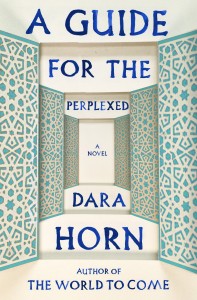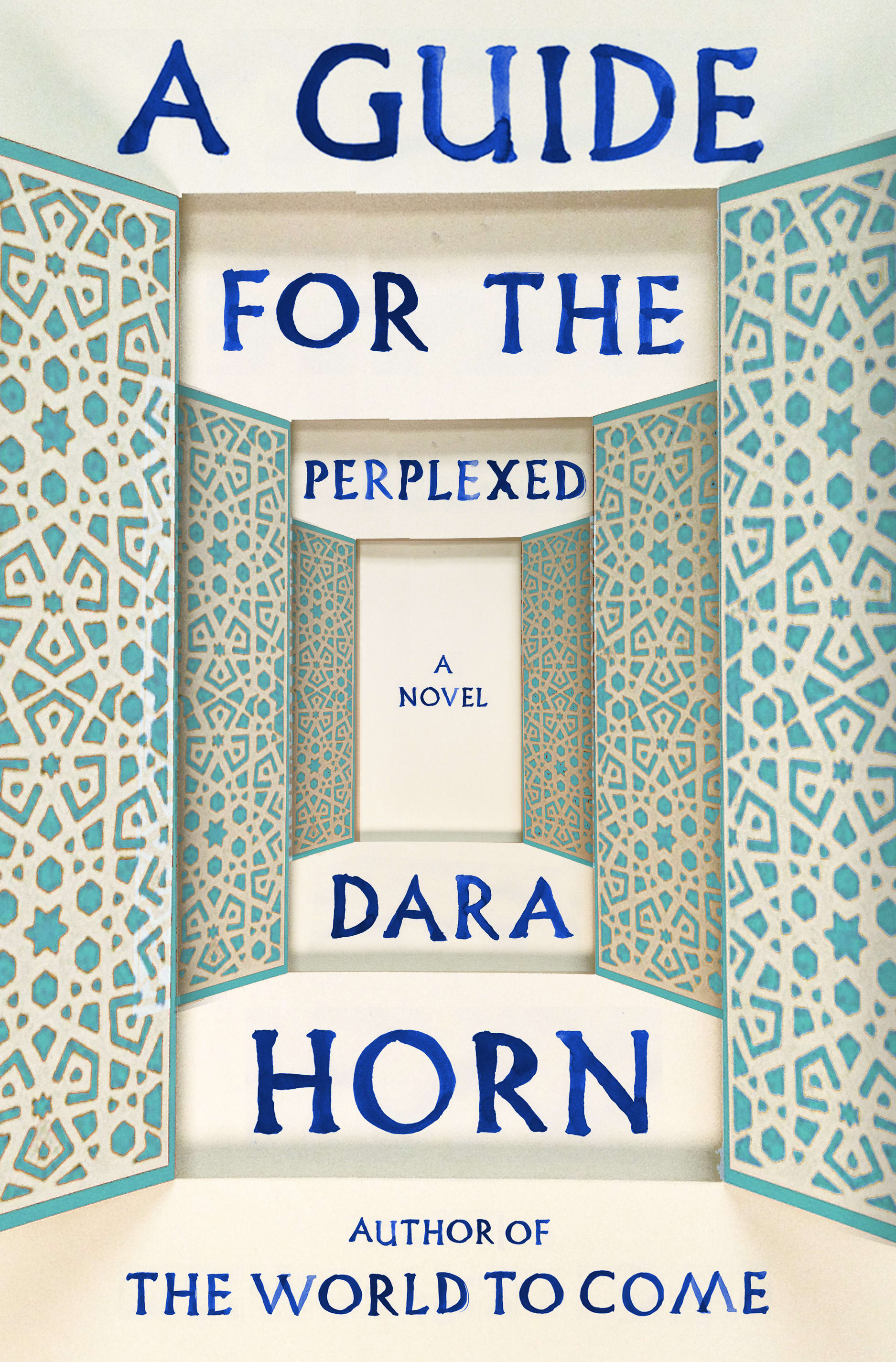 Dara Horn lives a few blocks from where she was grew up in Short Hills, New Jersey — the setting, she noted, of Philip Roth’s first book, “Goodbye Columbus.” Her family is from Newark and she describes Roth’s work, for her, as “historical fiction.” The mother of four (all below the age of nine) is the author of four books. Her latest, “A Guide for the Perplexed,” was published in October. It’s a tough book to summarize, being at once the story of two sisters and a Google Glass-like program, a retelling of the Biblical story of Joseph, a kidnap thriller, historical fiction about Rabbi Solomon Schechter, the Conservative rabbi who discovered the Cairo Genizah, and the Rambam and his opus, Moreh Nevuchim. If the story has a protagonist, it’s Josephine, a computer genius and the creator of Genizah, a software program that records everything (though in the book, Josephine notes that a good majority of their users use it to film their cats).
Dara Horn lives a few blocks from where she was grew up in Short Hills, New Jersey — the setting, she noted, of Philip Roth’s first book, “Goodbye Columbus.” Her family is from Newark and she describes Roth’s work, for her, as “historical fiction.” The mother of four (all below the age of nine) is the author of four books. Her latest, “A Guide for the Perplexed,” was published in October. It’s a tough book to summarize, being at once the story of two sisters and a Google Glass-like program, a retelling of the Biblical story of Joseph, a kidnap thriller, historical fiction about Rabbi Solomon Schechter, the Conservative rabbi who discovered the Cairo Genizah, and the Rambam and his opus, Moreh Nevuchim. If the story has a protagonist, it’s Josephine, a computer genius and the creator of Genizah, a software program that records everything (though in the book, Josephine notes that a good majority of their users use it to film their cats).
Dara said that the book began like many of her other works: with tossing out a hundred pages. “I have hundreds of pages of novels that I’ve thrown away,” she said. Some of her earliest writing was in journals she kept during her family’s exotic vacations to destinations such as Cambodia and China; “It wasn’t a vacation unless you got shot,” she said. Dara explained that she and her siblings thought their parents were spies. (They weren’t: her father was a dentist and her mother was a schoolteacher.)
Dara says her children are her harshest critics. Her eight-year-old daughter found a copy of an incomplete manuscript of her latest book and told Dara that her characters were “mean.” Her six-year-old son was gravely disappointed when he discovered his mother only wrote four books. “Mommy, that’s, like, nothing… I wrote four books yesterday,” he told her. (To be fair, her books are significantly longer.)
Dara sat down with OU.org to discuss her latest book, her thoughts on the Biblical story of Joseph and her thoughts about a world in which nothing is forgotten.
Q: How did this book start?
A: I wish I had a nice anecdote; I haven’t made up a good one yet. In the past few years we’ve had this explosion of social media in people’s daily lives — there’s this hyper-present of what we do online. All these things are archived and stored, more than we ever expected, as revealed by the NSA. You used to buy a roll of film for an occasion and take 26 pictures; now with digital cameras you can take hundreds of pictures in a day. It becomes too much information — too much data on the past — saving everything becomes saving nothing. Since you don’t have to make a choice of saving something, you eliminate the possibility of creating a story. The ability to save all this information is debilitating because it takes away the possibility of the art of forgetting. That was interesting to me. Everything you do is recorded and in a way it makes forgiveness impossible. I’m 36 and I’m fortunate that the idiotic things I did when I was a teenager are not widely accessible. I feel sorry for people who are younger than me who, in a sense, will never again meet a stranger.
Another impulse to why I wrote the book is I’ve always been interested in the Joseph story. There were a lot of things that interest me in that story: how we control our past; how knowing information changes the past and the future. One of the most fascinating moments in the story is in Vayigash, when Joseph meets his brothers and he finally reveals himself, by saying, “Don’t be angry at yourselves for selling me to this place, because it was to save life that God sent me ahead of you.” That’s an astonishing thing to say — that this heinous crime was a part of a benevolent act. There are a few ways of looking at it. Joseph knew it all along he had a clairvoyance that allowed him to see God’s plans. This is an act of forgiveness. We always thought he had this ability to see the future, what he exhibits is also the ability to control the past. He takes these events in his family’s lives and chooses to interpret in a way [so as] to forgive his brothers.
How did the Joseph story influence the book?
The tension in the Joseph story is about free will and fate. This is a story about Joseph predicting the future, the outcomes are all laid out, but what is bizarre and fascinating is it’s not a story like the Exodus where God is intervening in human affairs in obvious ways. There’s no miracles or overturning of natural law — the only role of God is that God was with Joseph. God doesn’t talk to Joseph, there’s no active divine role, but what is amazing is you see that everything is foreseen, yet everything that happens, happens because of the agency of the characters, because of the character’s choices, which are ethical choices: the brothers, the wife of Potifar, the choices that Joseph makes. These all are presented as entirely human choices, so you can look at this story and see it all as an act of free will or you can look at this story and see it as part of being a preordained plan. There’s no contradiction between those two possible ways of interpreting the story. In fact, it’s almost impossible to interpret the story in one way and not the other. You need to interpret the story in both of those ways. As it says in Pirkei Avot, “Everything is foreseen, but freedom of choice is granted.” It’s the paradox that the Rambam talks about in Guide for the Perplexed: If everything is foreseen how do we have free will? Or is free will just a product of ignorance of a plan? Rambam argues, that it is possible that we have free will but it doesn’t preclude things from being foreseen, that God foresees every possibility including the one that is chosen. It doesn’t quite work, philosophically. What interested me was that tension between our responsibility for what happens and the responsibility for things happening beyond our control. That theme is a guiding aspect of most of the plot of the book.
That’s pretty intense.
It has a lot of challenging philosophical ideas but it’s also a thriller that you can read on the beach, depending on how deep you want to delve. It’s actually about a software developer who gets kidnapped in post-revolutionary Egypt.
A heavy part of the book is sibling rivalry: how much is based on your own life?
I’m not a very autobiographical writer. I’ve been very fortunate that I have a life that would make a really boring novel. I’ve been really blessed.
How does the idea of remembering everything tie into parenting?
I always thought about having this comprehensive record of everything but, raising my own children, I’m continuously reminded of everything I didn’t remember. It was always my fantasy of turning life into this archive you could visit, and now social media has turned it into this horrible nightmare. It’s less recording everything that happened, but the way in which our choice of what to remember gives our life a personal meaning. There are no stories in real life; real life is a sequence of events, and it’s only the way we choose to interpret these events that turns it into a story.
The words of this author reflect his/her own opinions and do not necessarily represent the official position of the Orthodox Union.

